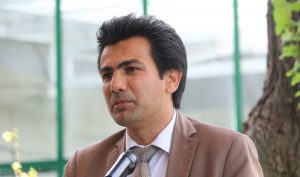Respect for Human Rights Must be the Basis of the Peace Talks

One of the issues that civil society and women’s rights activists have always emphasized as important and fundamental issues to be discussed in peace talks is the protection of the fundamental rights of citizens. According to these activists, peace talks should be based on respect for human rights.
In an interview with the CSHRN, Mr. Parwani said that the protection of the fundamental rights of the people must be the red line of the government, and the dialogue must be based on the acceptance of the undeniable rights of the citizens. “The protection of the fundamental rights of citizens is enshrined in the constitution for freedom of expression and thought, the right to education and employment; and there is no more complete document to respect human rights.” Said Mr Parwani.
CSHRN: What is your assessment of the peace talks?
Parwani: negotiations should replace guns and bloodshed. Also, the Taliban should be given the opportunity to express their demands. Even if the peace talks fail, it can still change the behaviour and beliefs of both parties.
CSHRN: How can the presence of women affect the peace talks?
Parwani: The presence of women in the composition of the team, especially knowledgeable and experienced women, can have two messages. First, women, as half the population of the country, should be present at such an important event. Second, the absence of female representatives in the Taliban’s team shows how they eliminate the presence of women in an important event. Moreover, female representatives can discuss and defend their demands, achievements, and changes in their rights and freedoms and to make them understand that today women in Afghanistan are capable of raising their voice to protect their rights in peace talks with men.
CSHRN: Do you think the negotiating team has the capacity to defend women’s rights?
Parwani: It will be more effective if the negotiating team proceeds in consultation and coordination with institutions such as the Ministry of Peace, the High Council for Reconciliation and dozens of civil society organizations working voluntarily for peace. The members of the negotiating team, except for a few who have been selected on the basis of political affiliation are capable of negotiating and have sufficient knowledge of Afghanistan and its history. However, peace negotiations should not be exclusive to the peace negotiating team members. Therefore, they should coordinate with partner institutions.
CSHRN: How do you think the presence of the Taliban will affect the activities of women in society?
Parwani: The presence of the Taliban in power depends on two documents and two types of reactions. Of the two documents, the first is the document signed between the Taliban and the United States, and the second is a document signed between the Taliban and the government of the Islamic Republic of Afghanistan. There are two types of reactions: First, civil society’s reaction during the negotiations. Second, civil society’s reaction after a signed agreement. This determines how the Taliban will affect the role of women in society. If we, as civil society activists, remain silent, the Taliban’s extremist and restrictive demands will surely be fulfilled. In my opinion, the Taliban cannot have much influence if there is cohesion among the freedom fighters. Today, thousands of people have access to the media where people will react to the outcome of the negotiations. However, if we do not react, restrictions might be imposed and the achievements of recent years might be ignored.
CSHRN: What guarantees that the Taliban fulfil their commitments after the peace talks?
Parwani: There is no guarantee for an insurgent group like the Taliban which has a history of repressing the people. Western societies, especially the United States, can help both the parties to fulfil their commitments. But what guarantees the preservation of freedoms is more our awareness and solidarity of the active forces of society that can put the parties under civil pressure. The international community will also change their position based on the situation. Therefore, ultimately, everything depends on us.
According to Mr Parwani, the government of Afghanistan has been able to challenge the US policy of peace agreement with the Taliban. Afghanistan has defended the republic system against the Taliban’s Islamic Emirate which is the will of the people and civil society activists.